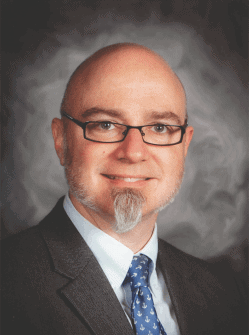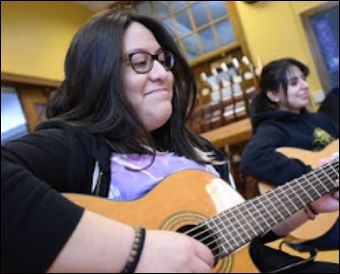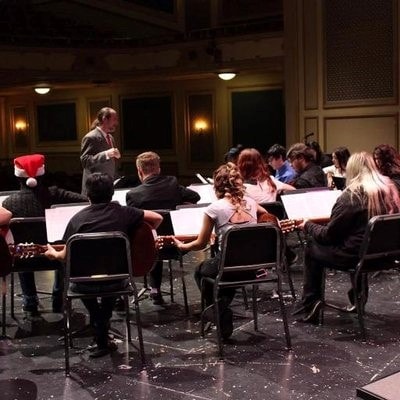/ News Posts / Guitar Class in the Badger State: Wisconsin
Guitar Class in the Badger State
Number 44: The State of Wisconsin
By Thomas Amoriello Jr.
NAfME Council for Guitar Education Chair
In this edition of “50 States of Guitar Class,” the NAfME Council for Guitar Education visits Reuther Central High School in Kenosha, Wisconsin, which is a part of the Kenosha Unified School District. Guitar educator Peter Rallo has made a difference in the lives of many high school students.
In a Kenosha News story by Bill Siel, then student, Amari “Mar-Mar” Robinson shared that Mr. Rallo was her most influential teacher. “In this class, I am able to play guitar, which is something I have wanted to do since I was a child. This class helped me to meet other people who share my interest in music. Mr. Rallo is like the guardian over us. He gives us life lessons on our issues as well as makes learning fun. He looks out for our well-being and does whatever it takes to get our skills to the level they need to be. He also helps us with our attitudes, when they occur.” Her most memorable high school moment was “going on a tour with the Guitar Ensemble and Choir last year. Going on tour showed us the tour experience as well as how people outside of family and friends react to our music.”
The NAfME Council for Guitar Education would like to thank Mr. Rallo for sharing his knowledge with the NAfME membership.
Please tell us about your school and overall music program.
Reuther is an alternative high school located in Kenosha, Wisconsin. We are a smaller school serving around 375 students a year. The only musical ensemble is guitar, and that fluctuates between 14 and 20 members. The group mainly focuses on Bluegrass and Classical music for our repertoire. We also offer guitar classes that serve an additional 25 students per quarter. We also offer a digital composition course which gives the students a chance to work with Ableton. Up until last year we had a choir, but that was dropped to add leadership. (Leadership is a course that focuses on positive personal qualities with an emphasis placed on public speaking.)
Please tell us about your own personal musical background growing up and your collegiate experience.
I have been studying guitar since the age of 8, both plectrum and classical styles, and performed throughout high school in jazz and rock bands. I studied music education at Carthage College with an emphasis in choral, general, and instrumental music. While attending Carthage I also performed with several instrumental and vocal ensembles.
How do the guitar family of instruments fit into your teaching?
Guitar and Bass are the two instruments offered at Reuther.What obstacles did you face when you were first hired at your school? Now?
I had a pile of guitars from the 1970s that were unplayable with the year starting in a few days. I disassembled all the instruments and was able to build about 14 guitars from the parts. Since then we have been able to purchase 20 new guitars, and things are going well.
Also, finding guitar ensemble repertoire that could cover a wide range of ability levels is a challenge. I found that it has been easier to arrange music for the group. Reuther is an alternative high school that is currently running a 4-block schedule with a 5th period enrichment time (I-Block). Even though I-Block is the guitar ensemble time, it is also the period for students to get help on missing work. That being said I rarely have a full period with all students present.
What kind of classes related to the guitar do you teach?
Reuther offers an introductory guitar class up through Guitar 4-2, and each class is one quarter in length.
Intro guitar is a quarter-long class that is required of every freshman at Reuther. This course will introduce the history and methods of playing the guitar. The beginner’s level of our guitar course will teach students how to hold a guitar, note placement, and basic fingering exercises.
Sophomore year students can begin to work their way through the rest of the courses. Which go from guitar 1-1 up to guitar 4-2. These courses offer exercises concerning major and minor scales, common chord progressions, and improvisational techniques.
The main curriculum for these courses is the Mel Bay Modern Guitar Methods, Mauro Giuliani’s 120 Studies for Right Hand Development, World’s Favorite Classical Guitar Solos. With Reuther’s unique schedule some students are able to practice up to two hours a day in school.
What would you like to say to the non-guitarist music educator who is about to or interested in incorporating the guitar into their program?
It is an easy instrument to incorporate into any situation, fairly simple to get a few basic chords down, and most students enjoy it. We implemented at a slow and digestible pace. Don’t be afraid to arrange parts for a guitarist and drop them into the regular band or orchestral setting.
Do you have any success stories you would like to share about students?
I had a student who came to Reuther as a freshman, and she had never touched a guitar. Last year, for her final, she performed the Bach Cello suite. It was a pretty cool! Not every student takes it to that level, but every year, people graduate with the ability to enjoy playing an instrument for the rest of their lives. Some of them have gone onto study music in college and others join or start up bands and have continued to share music in the local community.
Over the last five years I have been taking my guitar ensemble down to Branson, Missouri, to get some experience performing on a larger stage. In Branson, our very talented Reuther music students were given a wonderful opportunity to perform and experience what it would be like to work on a professional stage in a fast-paced environment. The guitar ensemble has the chance to perform in a few different theaters. Before each night’s performance, the students will experience an hour-long clinic where professional musicians sit down and speak with them about what is it like to work in the music industry.
What do you tell your talented students who are planning to pursue music or guitar studies in high school or college after they finish with you?
I normally try to encourage them to go into music business, education, recording, and therapy. I very seldom encourage a student to just go to school for performance. It’s good to have a backup plan.
Do you have any networking or advocacy tools that have worked for you promoting your program that would help other educators?
Kenosha has several local music organizations and clubs that allow for my students to perform. I have found that our greatest asset has always been local musicians. I have never had any trouble finding what I need when I reach out to other artists.
What kind of future do you see for guitar in music education in Wisconsin schools?
I have seen other groups popping up in the Midwest, but it is a tough sell. It has definitely become more accepted over the years, but there is still a stigma about the instrument in the traditional band and orchestral setting. As Reuther is an alternative school, we are not involved in every event that takes place in the district. We have several large festivals celebrating the arts, and I have attempted to get the guitar ensemble in both the band and orchestral events with no success.
What type of lesson plans have you done for your classes that may be unique?
I’m not sure if anything I do is unique. I’m a huge fan of reading so my kids spend the majority of their time just reading music and getting in mini private lessons every couple of days.
Do you do any musical performances or activities outside of your public school teaching duties?
I am currently in the Peacetree Allstars and The Dillweeds; both groups stick to local shows. My wife and I also organize and run the Peacetree Music Festival. It’s a local festival that takes place on the shores of Lake Michigan consisting of Americana, Jam, Fusion, and Bluegrass groups.
Past “Guitar Class in 50 States” articles:
- Number 50: The Granite State (New Hampshire)
- Number 49: The Green Mountain State (Vermont)
- Number 48: The Mountain State (West Virginia)
- Number 47: The Hoosier State (Indiana)
- Number 46: The Mount Rushmore State (South Dakota)
- Number 45: The Pine Tree State (Maine)
- Number 43: The Constitution State (Connecticut)
- Number 42: The Evergreen State (Washington)
- Number 41: The Pelican State (Louisiana)
- Number 40: The Beaver State (Oregon)
- Number 39: The Equality State (Wyoming)
- Number 38: The Empire State (New York)
- Number 37: The Old Line State (Maryland)
- Number 36: The Centennial State (Colorado)
- Number 35: The Bay State (Massachusetts)
- Number 34: The Sooner State (Oklahoma)
- Number 33: The Prairie State (Illinois)
- Number 32: The Hawkeye State (Iowa)
- Number 31: The Volunteer State (Tennessee)
- Number 30: The Palmetto State (South Carolina)
- Number 29: The Natural State (Arkansas)
- Number 28: The Tar Heel State (North Carolina)
- Number 27: The Magnolia State (Mississippi)
- Number 26: The Peace Garden State (North Dakota)
- Number 25: The Treasure State (Montana)
- Number 24: The First State (Delaware)
- Number 23: The Buckeye State (Ohio)
- Number 22: The Yellowhammer State (Alabama)
- Number 21: The Sunflower State (Kansas)
- Number 20: The Great Lakes State (Michigan)
- Number 19: The Lone Star State (Texas)
- Number 18: The Bluegrass State (Kentucky)
- Number 17: The Golden State (California)
- Number 16: The Show-Me State (Missouri)
- Number 15: The Keystone State (Pennsylvania)
- Number 14: The Last Frontier State (Alaska)
- Number 13: The Beehive State (Utah)
- Number 12: The Peach State (Georgia)
- Number 11: The Cornhusker State (Nebraska)
- Number 10: The Gem State (Idaho)
- Number 9: The Old Dominion (Virginia)
- Number 8: The Aloha State (Hawaii)
- Number 7: The Land of Enchantment (New Mexico)
- Number 6: The Sunshine State (Florida)
- Number 5: The Grand Canyon State (Arizona)
- Number 4: The Ocean State (Rhode Island)
- Number 3: The North Star State (Minnesota)
- Number 2: The Silver State (Nevada)
- Number 1: The Garden State (New Jersey)
About the author:
 Thomas Amoriello Jr. serves as the chair on the NAfME Council for Guitar Education and is also the former Chairperson for the New Jersey Music Education Association. Tom has taught guitar classes for the Flemington Raritan School District in Flemington, New Jersey, since 2005 and was also an adjunct guitar instructor at Cumberland County College, New Jersey, for five years. He has earned a Master of Music Degree in Classical Guitar Performance from Shenandoah Conservatory and a Bachelor of Arts in Music from Rowan University. He is the author of the children’s picture books A Journey to Guitarland with Maestro Armadillo and Ukulele Sam Strums in the Sand, both available from Black Rose Writing. He recently made a heavy metal recording with a stellar roster of musicians including former members of Black Sabbath, Whitesnake, Ozzy Osbourne, Yngwie J. Malmsteen’s Rising Force, and Dio that was released on H42 Records of Hamburg, Germany. The record released on 12-inch vinyl and digital platforms has received favorable reviews in many European rock magazines and appeared on the 2018 Top 15 Metal Albums list by Los Angeles KNAC Radio (Contributor Dr. Metal). Visit thomasamoriello.com for more information.
Thomas Amoriello Jr. serves as the chair on the NAfME Council for Guitar Education and is also the former Chairperson for the New Jersey Music Education Association. Tom has taught guitar classes for the Flemington Raritan School District in Flemington, New Jersey, since 2005 and was also an adjunct guitar instructor at Cumberland County College, New Jersey, for five years. He has earned a Master of Music Degree in Classical Guitar Performance from Shenandoah Conservatory and a Bachelor of Arts in Music from Rowan University. He is the author of the children’s picture books A Journey to Guitarland with Maestro Armadillo and Ukulele Sam Strums in the Sand, both available from Black Rose Writing. He recently made a heavy metal recording with a stellar roster of musicians including former members of Black Sabbath, Whitesnake, Ozzy Osbourne, Yngwie J. Malmsteen’s Rising Force, and Dio that was released on H42 Records of Hamburg, Germany. The record released on 12-inch vinyl and digital platforms has received favorable reviews in many European rock magazines and appeared on the 2018 Top 15 Metal Albums list by Los Angeles KNAC Radio (Contributor Dr. Metal). Visit thomasamoriello.com for more information.
Did this blog spur new ideas for your music program? Share them on Amplify! Interested in reprinting this article? Please review the reprint guidelines.
The National Association for Music Education (NAfME) provides a number of forums for the sharing of information and opinion, including blogs and postings on our website, articles and columns in our magazines and journals, and postings to our Amplify member portal. Unless specifically noted, the views expressed in these media do not necessarily represent the policy or views of the Association, its officers, or its employees.
Catherina Hurlburt, Marketing Communications Manager. March 5, 2020. © National Association for Music Education (NAfME.org)
Published Date
March 5, 2020
Category
- Ensembles
Copyright
March 5, 2020. © National Association for Music Education (NAfME.org)






